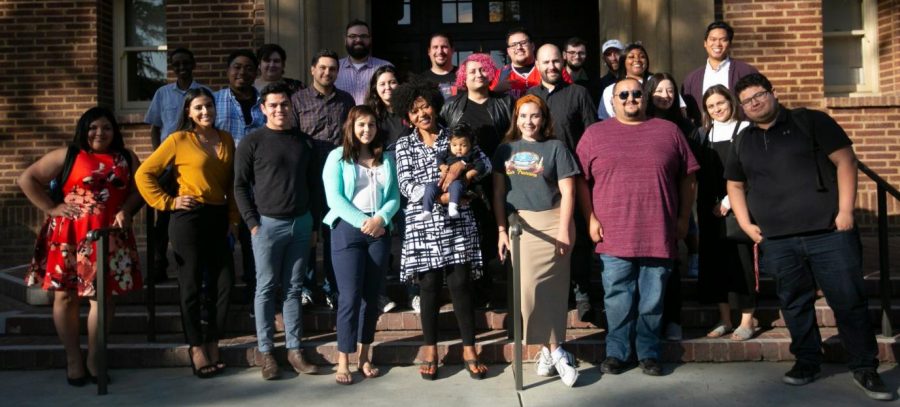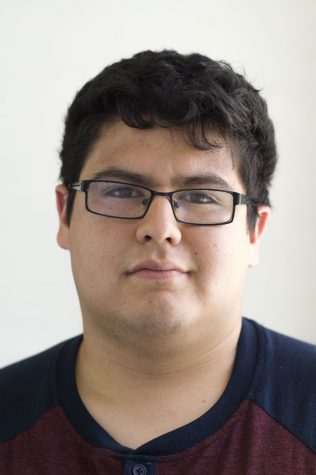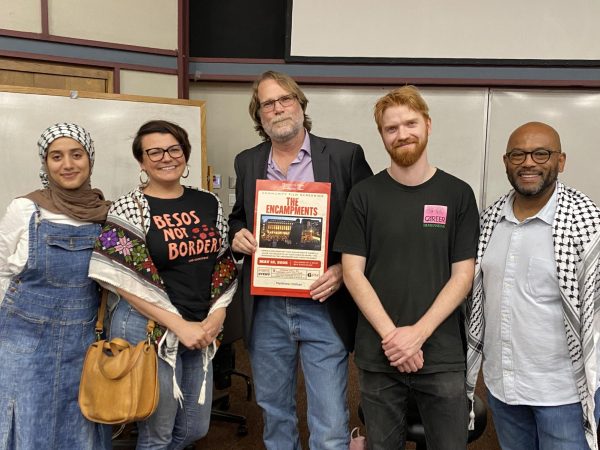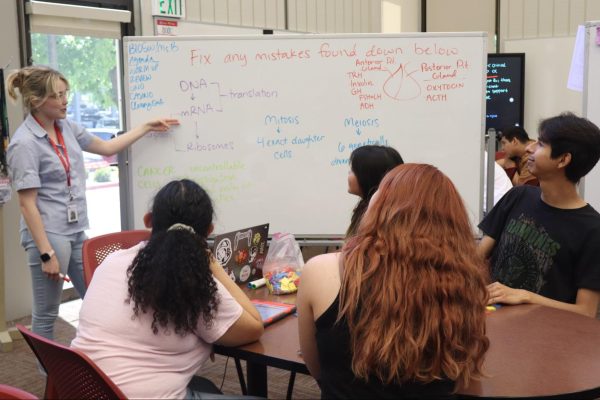Dympna’s Garden of Reporters
Journalism Instructor Survived the Biafran War, Journeyed to the US and Rebuilt the Rampage, Now She’s Retiring
Photo by: Photo courtesy of Larry Valenzuela
Journalism instructor Dympna Ugwu-Oju poses with multiple generations of Rampage reporters on Wednesday, Nov. 6, 2019. Ugwu-Oju has advised the Rampage for over 10 years.
Dympna Ugwu-Oju should be used to surprises, especially from her students.
For over 10 years, her career has been defined by would-be journalists entering the revolving door of the Rampage–each one entering a newsroom, almost always by accident–without a clue about reporting.
And every time there is a handful that turn into fully formed reporters before the year is out, accomplishing things they never could have imagined.
Still, when the doors to the OAB 251 were thrown open on Nov. 6, and Ugwu-Oju saw her surprise retirement party, she was shocked. Tears came almost immediately.
“This isn’t nice,” she said, crying, smiling and hugging Sydney Monet, a former Rampage reporter who planned the entire thing in tandem with both current and former students.
The room was packed with multiple generations of Rampage reporters. She embraced them one by one.
“When I heard she was retiring, I felt happy for her because she deserves to relax,” Ashleigh Panoo, a former Rampage editor in chief, said. “I also felt extremely lucky to have been one of her students.”
Lynn Badertscher, a best friend to Ugwu-Oju and a retired instructor at FCC, remarked that in all her years she’d never seen former students throw a retirement party for their instructor.
The Mother
In her memoir, “What Will My Mother Say,” Ugwu-Oju wrote that she grew up in Nigeria, in an area that was then-called Biafra. Her father died a month before she and her twin, Bernard Edoga, were born.
Ugwu-Oju’s mother was widowed at 26 with seven children.
Her mother, suddenly widowed in a culture that held unmarried women in low-esteem, found herself without a husband, stable home, money, or a plan.
A nun named Sister Mary Dympna suggested Dympna’s first name. St. Dymphna is the patron saint of the mentally disturbed. “Every time you call your daughter, you’ll be calling on St. Dympna to give you the strength you need,” the nun said. Dympna’s mother was an Ibo woman, she was illiterate and spoke no English.
Ugwu-Oju wrote that her mother remembers through the Ibo translator that St. Dymphna helps mad people. Her mother–widowed, abandoned, hopeless and depressed–accepted the name.
“My mother was a child bride,” she said. “When my father died, many people believed that my mother’s life was over and subsequently, ours would be over–there was no future for us.”
Ugwu-Oju feels that she can’t talk about herself without talking about her mother and the sacrifices she made for her family.
“She gave her children away,” she said. “She gave them to relatives because she believed she couldn’t provide for them adequately. The only ones that she kept were my twin and I.”
She rebuilt her life. By the time Ugwu-Oju was 3-years-old, her mother was the first woman to build her own home in her area. “She was just an incredibly strong person, but you wouldn’t know it from seeing her because she spoke so softly,” she said.
Ugwu-Oju’s mother was a traditional Ibo woman, raised to believe that a woman’s value derived entirely from her husband, and her ability to have children. She did not resent this role, even though she became a self-made woman in her time.
“I would say to her, ‘But mama, you are evidence that a woman can do anything,’ but she never really saw that,” Ugwu-Oju said. She couldn’t fathom that a woman could be a man’s equal, even though she was.
“She was my model,” Ugwu-Oju said. “She was the reason why I achieved, because I never wanted to fail her. I was terrified of breaking her heart.”
Warfare
Dympna Ugwu-Oju excelled in school. And school was her shield–it kept many, much older suitors at bay. She was just beginning secondary school (grades 7 through 12) when her mother’s heart was broken again.
The Biafran war began in 1967 and lasted until 1970. It ate three years of Ugwu-Oju’s life, her family’s life, her mother’s life. It was a civil war, driven by complex cultural differences–Ugwu-Oju, a child, knew none of it.
They were pushed from their home, their roof, their water, their electricity, with only the clothing on their back in the space of an evening.
Across Biafra, her other siblings were similarly displaced at different times, in different ways, as the tide of warfare swept through the region.
In its efforts to maintain normalcy, Biafra compelled students to return to school during the war, but was forced to travel 100 miles to attend the closest school that had not fallen to the enemy’s hands.
Regardless, her mother made it happen. For a week it was good.
Then it wasn’t. Ugwu-Oju and the other girls knelt in their dormitory for a nightly prayer. Minutes before they had gossiped about the day before, whispered, laughed. But as they knelt on the floor a jet screeched through the air and bombed the dormitory.
Ugwu-Oju wrote that, “even the most microscopic detail [of that night] becomes vivid and tormenting.” Most of the girls in her dormitory died that night, as a terrible light and the deafening sound of explosions eclipsed everything–except heat.
And then nothingness.
“I feel this is my third life,” she said. Ugwu-Oju wonders why she was lucky enough to survive when so many others didn’t. She wonders why she didn’t snap, become deranged and lost.
She thinks maybe it’s God’s grace, but even that is unfathomable. “I simply don’t understand why some people seem favored and others do not,” she said.
The next 28 months were spent on the run from enemy soldiers. Her memoir details death and struggle, constantly evading the enemy, once even saving her own mother from a burning building.
Sometimes it doesn’t even feel real.
“[My twin] would be the one I would ask, because we were together all our lives, ‘Did this really happen or am I making it up?’” she said.
Learning and Teaching in the U.S.
“No matter how long I live here, I’ll never be a hundred percent American,” Ugwu-Oju said. “There’s still a part of me that’s geographically, internally fixed in a place that’s thousands of miles away.”
Nigeria is home for Dympna, and her life there might have been very different. It was her eldest brother John, who managed to reach the U.S. and obtain a medical residency that brought her to the United States.
It was inconceivable for a 17-year-old girl to leave Nigeria for the United States. “My mother did not want me to go,” she said. Her mother wouldn’t be able to control her or the choices she made, as she had so far.
That control is part of why Ugwu-Oju is the person she is. She considers her mother a mentor, a person who pushed and pushed her to succeed, to be better than others because she was a woman.
But with that came contradictions.
Ugwu-Oju once overheard her mother saying something that would haunt her. She was about 6 or 7. “So much brain wasted on a girl, if only she had been born a boy,” she said. “She’s cut of the same cloth with her oldest brother. So much brain on a girl will just create difficulties for her.”
It did not discourage her. She became determined to do as well as a man could. Despite the war. Despite everything.
She knew from a young age she wanted to be a writer, and it was well known that the fastest way to write was journalism. Her mother, thinking of journalism as the work of television, didn’t think it was appropriate for a marriageable woman. Ugwu-Oju settled on English.
She enrolled at Syracuse College in New York, eventually studying her true passion of journalism. She wrote for the school paper before joining the Syracuse Gazette–a black newspaper where she felt she could make a difference.
“Many people wanted to recruit me, and I’m sure if I’d really tried I could have gotten into big publications,” she said.
Ugwu-Oju left the Gazette to teach English and composition in New Jersey. She spent five years in this role mastering the ins and outs of grammar and structure before her husband’s career brought the couple to California.
Her work as an English instructor continued at as an adjunct professor at the Madera Community College Center where she frequently worked with students who didn’t speak it as a first language.
“I felt that my mere presence was motivation for the students, because they could hear I wasn’t born there, and it helped them realize they too could [speak English],” she said.
She loved helping students develop a voice. Seeing students who didn’t think they could write an essay, didn’t think they could write anything, suddenly triumph was the light that motivated her.
The Rampage
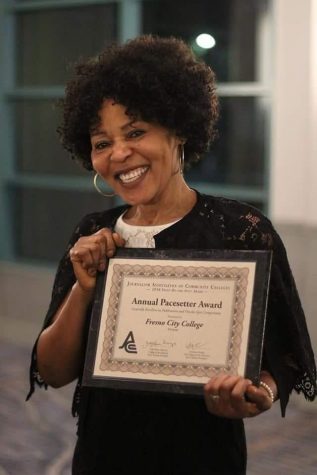
Dympna Ugwu-Oju, Rampage adviser, holding an annual pacesetter award from the Journalism Association of Community Colleges. During her tenure as adviser, the Rampage has taken this award home several times.
Throughout her earlier career Ugwu-Oju taught journalism, but at Madera she taught it as an adjunct. But a full-time journalism instructor position opened at Fresno City College. She got the call from Lynn Badertscher.
She asked Ugwu-Oju what she thought about teaching journalism full-time at FCC. “[Dympna] said, ‘It’s my dream,’” Badertscher said.
She got the position, and the fall before her first semester as advisor of the Rampage started, she spent her summer in the Rampage.
“[The program] was dead,” Ugwu-Oju said. There was no journalism degree. No curriculum. The advisor was an adjunct, and the Rampage was taught in the evening because it was all the time he had.
Badertscher and Ugwu-Oju found $3,000 randomly throughout the office, probably payments for advertisements in the student-paper that weren’t properly filed. The two got to work, spending that summer writing curriculum, rebuilding the program from the ground up–reviving student journalism at FCC.
One of Ugwu-Oju’s biggest goals was to recruit minority students. “I wanted African Americans because I felt that history is written by people who know how to write, right?” she said.
She wanted African Americans, Latinos, immigrants, those that wouldn’t be thought of as typical journalists at that time, or even now.
Cresencio Rodriguez was an editor in chief of the Rampage. Like Ugwu-Oju, he is an immigrant. “I opened up to her about my immigration status and she responded with her own story of being an immigrant and having an immigrant family,” he said. She didn’t look at him strangely. He felt that she understood him.
Ugwu-Oju doesn’t like to take all the credit–she often doesn’t take any. “Students make me feel better than I am,” she said. “I’ve been blessed with people who come in with different talents.”
She talked about Sydney Monet, a master organizer. Ram Reyes, a designer, an aestheticist, and photographer. Cresencio Rodriguez, a powerful long-form storyteller.
“We had students who were great at photography, we had people who were great at arts,” she said. The Rampage regularly over-performs at the Journalism Association of Community College (JACC) conferences, competing against over a hundred other students and often placing highly. Again, Ugwu-Oju takes no credit.
Her happiest memories with the Rampage are watching her students do well. She sees students in doubt, without the skills, grow into the role of a journalist–they learn by doing.
She remembers a student named Austin who was unconfident, and trembled when challenged. He competed in the editorial cartoon competition at JACC, and as the names were read, first the honorable mentions, then fourth place, then third…and Ugwu-Oju said with each name he drew further into himself.
And then they called his name for first. “He came back a different person,” she said.
Patrick Forrest, a former Rampage news editor and writer at Blavity, spoke at the retirement party about how Ugwu-Oju forced him to write news. She wouldn’t let another black student be pigeonholed into sports writing.
He later said that taking the Rampage at that time was the most consequential choice of his life. “Almost every professional development I have taken from that point has a direct line to that decision,” he said.
After his time with the Rampage, Forrest was given the opportunity to interview President Barack Obama. He credits Ugwu-Oju–her pressure to write news, her support–for that chance.
She can tell endless stories about her students’ success. She tells these stories with the keen eye of a reporter, with the attention to detail and purpose of a natural storyteller.
Trials
With victory inevitably comes defeat, and with triumph comes loss.
Ugwu-Oju lectures often on a famous Rampage foible, when a student plagiarized a Fresno Bee story and, as a result, said that an athlete had been charged with rape when those charges had been dropped.
The aftermath was sudden and shocking. Players snatched papers from the hands of the reporters. The papers were burned. Ugwu-Oju was in her dean’s office, defending a student who, unbeknownst to her had plagiarized.
Ugwu-Oju went with the sports editor and apologized personally. She went to the president to explain that students made mistakes. “Nobody went to class, it was like we were bereaved, grieving,” she said. The other students were angry.
It happened because the student was new, taking on a story that should have been covered by a student with more experience. A truly student-run newspaper will inevitably make mistakes, just as an advisor will inevitably take the heat for those mistakes.
“I believe that everybody, regardless of their circumstances in life, deserves a chance,” she said. She believes in second chances, and third, she said perhaps too many chances. Still, she believes, “If we can, we should extend a hand to people, and help them get on their feet.”
It’s hard for Ugwu-Oju to give up on anybody, even students who fall into academic probation, who she’s frequently helped out with appeal letters. “What if people had given up on my mother at age 26 with seven children?” she asks. “Or given up on all of us? Where would we be?”
The student responsible for that famous mistake would become an editor in chief years later, a testament to the redemptive quality of the program, and of the woman who runs it.
Loss
Bernard Edoga, Ugwu-Oju’s twin, the one person who has been by her side all her life, died in 2012. He was visiting Nigeria for the sake of a foundation that aids in education and health in Nigeria. He was shot.
“It threw my life upside down,” she said. The person who verified her memories, who had stuck with her for the scope of her entire life was gone. “I felt myself descending into hell, literally when he died.”
She remembers being in her office, despondent.
It was Lynn Badertscher that came to her then and talked her into going to class for the first time, after those weeks of grief.
In 2018, Ugwu-Oju’s mother passed away. She thinks that her mother wouldn’t want her to forget who she is. “She’s incredibly proud of me,” she said, confidently, without hesitation. “But she also always wanted us to remember who we are.”
She says that it’s easy to forget, especially when things are comfortable, when she knows where her next meal is coming from. “Don’t forget that there are people who still don’t have that. She would always admonish me. ‘Don’t forget that there are people who need you.’”
The Garden
“There is a saying,” Patrick Forrest said during the retirement party. “Give people flowers while they’re here.” He gestured around the room, at the small sea of local journalists, former and current students. “Dympna. These are your flowers.”
After former Rampage editors, close friends and the Dean of the Division of Fine, Performing and Communications Arts Neil Vanderpool spoke, Ugwu-Oju took the stage. She said that she might have gone on a couple more years, maybe, and that she’ll miss working with the students the most.
Ugwu-Oju thinks she will spend her free time writing, perhaps another book about raising Black children in America. The book will undoubtedly concern itself with the divide between Dympna’s Ibo background, and the Black American experience.
Privately, she said that the students are her legacy. “To have lived to do this job and to have been a part of everybody’s success has really been an honor, it’s really a privilege,” she said. She thinks of the other professors who lecture in forum halls, whose students pass by, often anonymously.
She knows that the Rampage, her experience, is different. “To have [helped] these students put their work out there,” she said, “I really feel like I’ve lived my dream.”
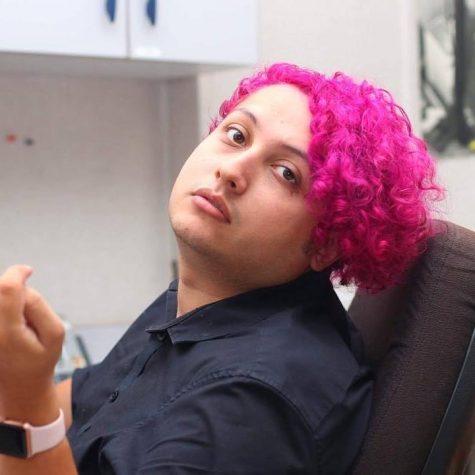
Tommy Tribble is the 25-year-old editor in chief of the Rampage, formerly the opinion editor. Tommy is an English major, a writer, an aspiring novelist,...

